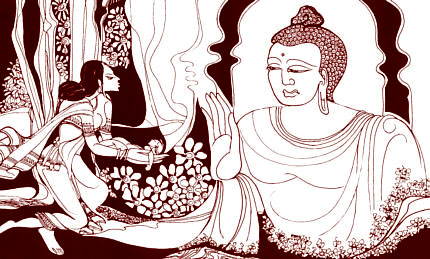
How Kisa-Gotami Came to Understand
Sorrow and Death
This is what we have been told. Ever since she was a little child Gotami was much thinner than the other girls, and as a result she had to put up with the insulting nick-name ‘Kisa-Gotami’, or ‘Skinny Gotami’. And then, on top of that, when she got married her husband treated her badly, so it was only when she bore a child that at last people started to treat her with some respect. At last, it seemed, she was to have some happiness in her life. However, just when her little boy was old enough to begin to run about and play, he became ill and died. At this point, remembering how much she had always been insulted before her little boy was born, Gotami became almost crazy with sorrow, and refused to believe that he was dead. So she took the little corpse from house to house, asking for medicine to cure her child. ‘Why are you asking for medicine?’ everyone said. ‘Can’t you see that the child is dead? You are crazy.’
But one of her neighbours, wiser and more kindly than the others, realised that Gotami’s strange behaviour was due to the depth of her sorrow, and said: ‘Why don’t you go to the Buddha; perhaps he can give you the medicine you need.’ So she took the dead body of her little boy, showed it to the Buddha, and said, ‘Please, O Wise One, give me some medicine for my poor sick child.’ The Buddha looked at Gotami and at the little dead body, and he could see that deep down Gotami had enough wisdom and strength to understand her sorrow and gain comfort, even though her terrible loss had made her almost mad with grief. So he said to her, ‘Go back to the town, knock on all the doors and wherever you find a household where no-one has died, ask them to give you a little mustard seed. Then, in the evening, bring me all the mustard seed you collect and we will be able to make some medicine for your child.’
So Gotami went into the town, still carrying the dead body of her little boy, knocked on the door of the first house and said, ‘If no-one has died in your family, please give me some mustard seed: I need it as a medicine for my sick child.’ The woman of the house looked at her sadly and said, ‘Certainly I can give you some mustard seed, but I’m afraid that we have had many, many deaths in our family.’ And Gotami looked sadly at the woman, saying, ‘In that case, I’m sorry for you, but your mustard seed will be of no use as medicine for my little boy.’ She went to the second house, and the same thing happened: yes she could have some mustard seed, but in that house also there had been many deaths and much sorrow. And at the third, fourth and fifth house it was the same. At every house where she knocked at the door the family told her that they also were in sorrow for the death of a dearly loved relative – a mother, or a father, or an uncle, or an aunt, or a son, or a daughter.
So by the evening, she still had no mustard seed for medicine for her child. However, something important had happened. As a result of sharing her sorrow with so many other people who also had lost a loved one, she found that her own sorrow was now different. No longer did she feel agonized and almost mad with grief. Instead, although she still felt sorrow at the loss of her child, she also knew that there were many others in the town who had also experienced a similar loss and the same terrible sorrow. Suddenly she realized that sorrow and death are part of how life is, not only for her but for everyone. So she took her dead child to the cemetery outside the town and, sadly, lovingly, buried his little body.
Then she went back to the Buddha, who asked, ‘Well, Gotami, have you got the mustard seed for the medicine?’ Gotami answered, ‘Thank you, O Wise One. No, I have not brought any mustard seed, but your medicine of the mustard seed has already worked, as you knew it would. Because I now see that my own sorrow is part of the sorrow of all people, and that the death of our loved ones is part of the pattern of life for everyone. That is the medicine I needed, and that is what you have helped me to understand.’
And from that time onwards, Gotami became one of the wisest and most respected followers of the Buddha. She became famous for her sad and beautiful poetry on the sufferings of women, caused by the pains of giving birth, the difficulties of marriage, the deaths of husbands and, particularly, the deaths of children.
Questions:
- Why did Gotami thank the Buddha for sending her to fetch mustard seeds from families where no-one had died?
- What if the Buddha had said to Gotami, ‘Stop crying, don’t you realize there are many people who have suffered the death of a child?’ Would this have been as helpful? How would it have been different for Gotami?
Dharma Issues:
- Dukkha– The importance of universal compassion in coming to terms with personal suffering.
- The nature of the ‘skilful means’ through which we can help others with their suffering.
Richard Winter
Cambridge Buddhist Centre
Based on C. Rhys Davids and K. Norman: Poems of Early Buddhist Nuns, Pali Text Society, pp.88-9, a translation of the Therigatha from the Pali Canon, and the commentary by Dhammapala (6th century AD) who claimed he was following traditional interpretations
Source www.clear-vision.org




